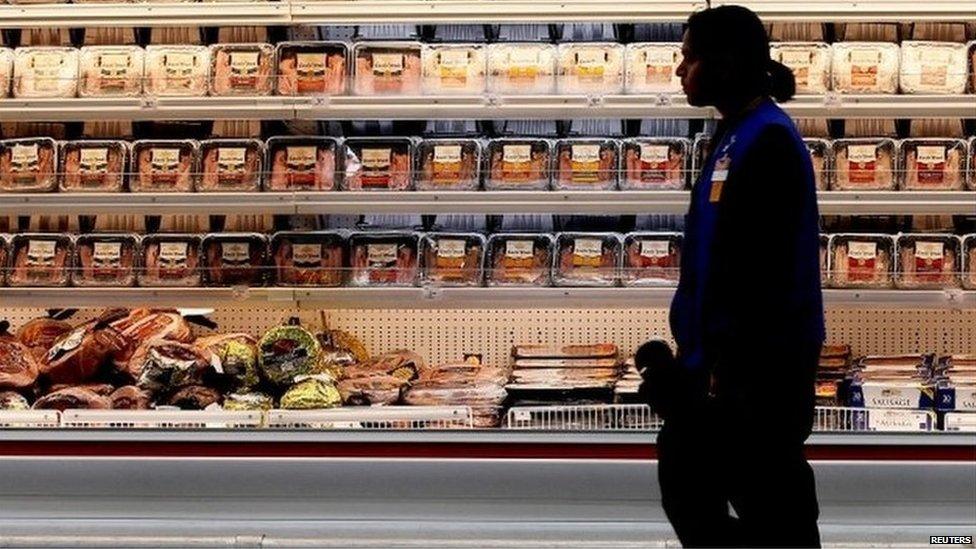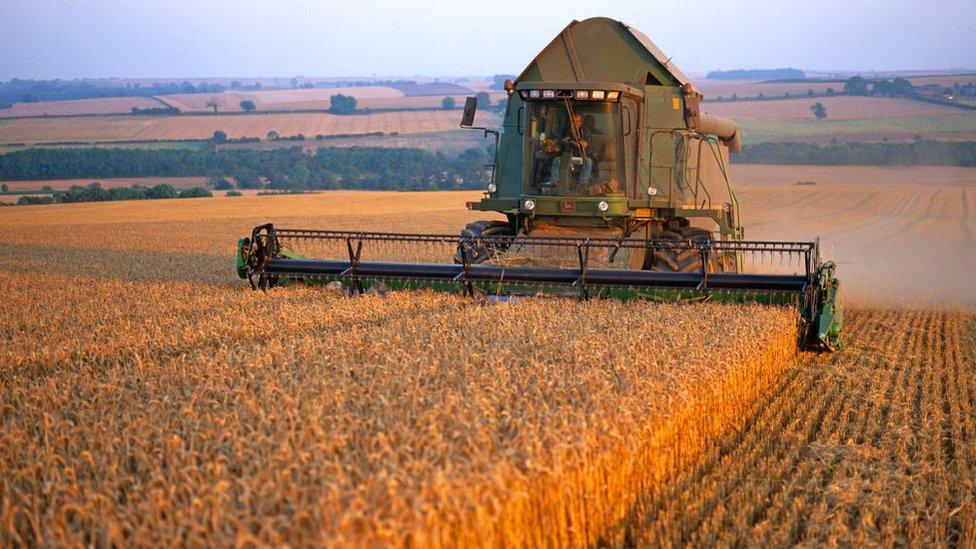Brexit: Farmers call for new law to guarantee food standards
- Published
- comments

Chlorinated chicken is a familiar feature on US shelves but is banned in the EU
Food standards must be protected after the UK leaves the EU, the farming industry has said.
The National Farmers Union said it had heard enough "warm words" from ministers and action was needed now.
Its president, Minette Batters, said any attempt to encourage cheap imports after Brexit in an effort to cut food bills should be "fought to the death".
Environment Secretary Michael Gove said standards should not be "bartered away" in pursuit of short-term trade gains.
In a speech to the Oxford Farming Conference, he also urged MPs to back Theresa May's Brexit deal later this month and warned of "considerable turbulence" for farmers if the UK left on 29 March without a deal with the EU.
The NFU has said a no-deal exit would be "catastrophic" for the industry and could potentially open the UK to goods that are not produced to the high standards of food safety, animal welfare and environmental protection that are the hallmark of British farmers.
It warned that to avoid food price rises as a result of a no-deal Brexit, the government could unilaterally lower import tariffs, encouraging food producers to buy in inferior materials.
"The biggest threat to us, the biggest threat to the environment is we decide to import cheap raw ingredients and add value to them under the union jack," Mrs Batters said.
"That is A1 critical right now. Get that bit wrong and it really will not work."
Campaigners have warned the UK could be forced to allow imports of hormone-treated beef and chlorine-washed chicken, currently banned by the EU, as part of any future trade deal with the US.
While Brexit offered a "massive" export opportunity for British farmers, Mrs Batters said there were real risks to the reputation of the industry if import controls were relaxed.
She urged Mr Gove to show leadership by getting guaranteed standards of minimum animal welfare, environmental protection and food "enshrined in some form of legislation".
"At the moment we've had a lot of warm words on standards," she said.
"We've had commitment from various ministers saying that we would not want a trade deal that brought food in produced to lower standards, but the real challenge is how.
"Of course agriculture's always the last chapter in any trade deal to be agreed so we feel it's really important, we don't want anybody lying down in front of a bus...we want it put in writing."
'Consumer uncertainty'
The government's proposals for agriculture after Brexit are contained in a new Agriculture Bill which is currently being debated in Parliament.
Environmental campaigners said it should include plans for an independent regulator to ensure that minimum standards to protect water, soil, wildlife and animal welfare are maintained.
"We can only guarantee long-term food security by protecting and managing the natural assets which enable food production," said its chairman Martin Lines.
"If the government does not amend the bill to include minimum standards - and put a stop to the environmental degradation caused by intensive farming - British farmers will be in danger of losing their livelihoods."
Mr Gove said concerns the UK would have to lower its food standards to access US markets were not new, because they had been raised a few years ago during discussions over the now aborted plan for an EU-US transatlantic trade and investment partnership.
"The two particular foods that were in the headlines were chlorine-washed chicken and hormone-enhanced beef. I have been clear that we do not intend to lower our standards, as that would lead to uncertainty for the consumer and would undermine the strength of our domestic production and the reputation it enjoys."
While there were different ways of providing the assurances that producers and consumers wanted, he said he was keen on exploring more informative food labelling to identify products that were "inappropriate, low quality or potentially unhealthy".
Labour called for a "cast-iron guarantee" that farming standards would not be undercut by any post-Brexit trade deals, while the Liberal Democrats said farmers needed certainty to plan ahead.
- Published3 January 2019

